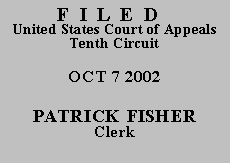

| UNITED STATES OF AMERICA, |
(D. New Mexico) |
On March 29, 2001, the United States filed a Verified Complaint for Forfeiture in Rem, alleging that $14,344.50 and 14 firearms were subject to forfeiture under 21 U.S.C. § 881(a)(6). On May 14, 2001, appellant pro se Miguel Montoya filed an Answer to the complaint, in which he identified himself as a claimant and asserted an interest in the $14,344.50 that the Government sought to forfeit. In a motion filed November 29, 2001, the Government moved the district court to dismiss and/or strike Mr. Montoya's answer for lack of standing. On April 9, 2002, the district court entered an order granting the Government's motion to dismiss, and on April 17, 2002, the district court entered a Final Judgment and Order of Forfeiture. Mr. Montoya appeals the district court's decisions to dismiss him from this forfeiture action and to order the forfeiture of the $14,344.50 to the Government.
Federal and local agents found the money and firearms during a search of Mr. Montoya's home on July 1, 1998. After being charged with various offenses relating to drug distribution, Mr. Montoya entered into a plea agreement on July 28, 1999. The agreement included a provision stating that Mr. Montoya would "forfeit to the United States all of his right, title, and interest in" the cash and weapons found during the July 1, 1998, search.
The district court found that Mr. Montoya had waived his interest in the property through the terms of his plea agreement and therefore lacked standing to challenge the forfeiture. Given that the parties do not dispute the central fact relevant to standing in this case--Mr. Montoya's entry into a plea agreement containing a forfeiture provision--we review the district court's determination de novo. See Guides, Ltd. v. Yarmouth Group Prop. Mgmt, Inc., 295 F.3d 1065, 1072 (10th Cir. 2002) ("We review issues of standing de novo."); Locke v. Saffle, 237 F.3d 1269, 1270-1271 (10th Cir. 2001) ("Because the parties do not dispute the facts, we have before us a purely legal question, and thus we review the matter de novo.").
A party challenging a forfeiture must show "'a facially colorable interest in the proceedings sufficient to satisfy the case-or-controversy requirement and prudential considerations defining and limiting the role of the court.'" United States v. Rodriguez-Aguirre, 264 F.3d 1195, 1204 (10th Cir. 2001), quoting United States v. 116 Emerson St., 942 F.2d 74, 78 (1st Cir. 1991). "[A]n allegation of ownership and some evidence of ownership are together sufficient
. . . ." United States v. U.S. Currency, $81,000, 189 F.3d 28, 35 (1st Cir. 1999).
Here, however, whatever interest Mr. Montoya once had in the currency, he relinquished in his plea agreement. This court has recognized that defendants can surrender their claims to seized property by assenting to forfeiture provisions included in plea agreements. In United States v. Le, 173 F.3d 1258, 1263 (10th Cir. 1999), a criminal defendant entered into a plea bargain under which he "agree[d] to forfeit and otherwise waive any ownership right he might possess in all items seized during the investigation of any of the acts alleged." The defendant then filed a motion for the return of his property under Federal Rule of Criminal Procedure 41(e), and the district court denied the motion. Id. We affirmed the district court's decision, observing that "[t]he district court was entirely correct in denying Le's motion because Le . . . relinquished any ownership rights he may have had in the property." Id. at 1278. See also United States v. Grover, 119 F.3d 850, 852 (10th Cir. 1997) (holding that a Rule 41(e) claimant "relinquished any possessory claim he had to the property" when he signed a forfeiture agreement at the time he entered into a plea bargain).
On appeal Mr. Montoya suggests that he should not be bound by his promise to forfeit the $14,344.50, because his due process rights were violated when he entered into the plea agreement with the United States. Mr. Montoya alleges that at the time of his plea, he was not given an adequate opportunity to object to the provision under which he abandoned his ownership interest in the money. But the record shows that Mr. Montoya failed to raise this argument before the district court. "Generally, an appellate court will not consider an issue raised for the first time on appeal." Tele-Communications, Inc. v. Commissioner, 104 F.3d 1229, 1232 (10th Cir. 1997).
Therefore, for substantially the reasons cited by the district court, we conclude that Mr. Montoya lacks standing to contest this forfeiture action. The district court's order granting the United States' motion to dismiss and the Final Judgment and Order of Forfeiture are AFFIRMED.
Entered for the Court
Harris L Hartz
Circuit Judge
*.This order and judgment is not binding precedent, except under the doctrines of law of the case, res judicata, and collateral estoppel. The court generally disfavors the citation of orders and judgments; nevertheless, an order and judgment may be cited under the terms and conditions of 10th Cir. R. 36.3.